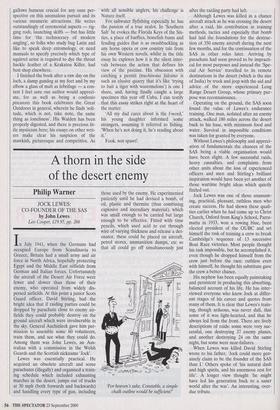A thorn in the side of the desert enemy
Philip Warner
JOCK LEWES: CO-FOUNDER OF THE SAS by John Lewes Leo Cooper, £19.95, pp. 266 In July 1941, when the Germans had occupied Europe from Scandinavia to Greece, Britain had a small army and air force in North Africa, hopefully protecting Egypt and the Middle East oilfields from German and Italian forces. Unfortunately the aircraft of the Desert Air Force were fewer and slower than those of their enemy, who operated from widely dis- persed airfields. At this point a junior Scots Guard officer, David Stirling, had the bright idea that if raiding parties could be dropped by parachute close to enemy air- fields they could probably destroy on the ground aircraft which were invulnerable in the sky. General Auchinleck gave him per- mission to assemble some 60 volunteers, train them, and see what they could do. Among them was John Lewes, an Aus- tralian with a commission in the Welsh Guards and the Scottish nickname 'Jock'.
Lewes was essentially practical. He acquired an obsolete aircraft and some parachutes (illegally) and organised a train- ing schedule which included exhausting marches in the desert, jumps out of trucks at 30 mph (both forwards and backwards) and handling every type of gun, including those used by the enemy. He experimented patiently until he had devised a bomb, of oil, plastic and thermite (thus combining explosive and incendiary material), which was small enough to be carried but large enough to be effective. Fitted with time pencils, which used acid to cut through wire of varying thickness and release a det- onator, these could be placed on aircraft, petrol stores, ammunition dumps, etc so that all could go off simultaneously just For heaven's sake, Constable, a simple chalk outline would be sufficient!' after the raiding party had left.
Although Lewes was killed in a chance aircraft attack as he was crossing the desert after a raid, his contribution in training methods, tactics and especially that bomb had laid the foundations for the destruc- tion of 350 enemy aircraft during the next few months, and for the continuation of the SAS in other roles later. Arriving by parachute had soon proved to be impracti- cal for most purposes and instead the 'Spe- cial Air Service' travelled to its remote destinations in the desert (which is the size of India) by truck and jeep with the aid and advice of the more experienced Long Range Desert Group, whose primary pur- pose was reconnaissance.
Operating on the ground, the SAS soon found the value of Lewes's endurance training. One man, isolated after an enemy attack, walked 180 miles across the desert back to his base, with minimum food and water. Survival in impossible conditions was taken for granted by everyone.
Without Lewes's philosophy and appreci- ation of fundamentals the chances of the SAS being a viable organisation would have been slight. A few successful raids, heavy casualties, and complaints from other units about the loss of experienced officers and men and Stirling's brilliant inspiration would have been yet another of those wartime bright ideas which quietly fizzled out.
Jock Lewes was one of those unassum- ing, practical, pleasant, ruthless men who create success. He had shown these quali- ties earlier when he had come up to Christ Church, Oxford from King's School, Parra- matta in 1933, won a rowing blue, been elected president of the OUBC and set himself the task of training a crew to break Cambridge's sequence of 13 successive Boat Race victories. Most people thought his task impossible, but he accomplished it, even though he dropped himself from the crew just before the race: ruthless even with himself, he thought his substitute gave the crew a better chance.
His nephew has been equally painstaking and persistent in producing this absorbing, balanced account of his life. He has inter- viewed everyone who knew Jock at differ- ent stages of his career and quotes from many of them. It is clear that Lewes's train- ing, though arduous, was never dull, that some of it was light-hearted, and that he always led from the front. There are lively descriptions of raids: some were very suc- cessful, one destroying 37 enemy planes, and another destroying 24 on the same night, but some were near-failures.
When Lewes was killed David Stirling wrote to his father, 'Jock could more gen- uinely claim to be the founder of the SAS than I.' Others spoke of 'his natural dash and high spirits, and his enormous zest for life'. A longer view thought 'he might have led his generation back to a saner world after the war'. An interesting, over- due tribute.






















































































 Previous page
Previous page